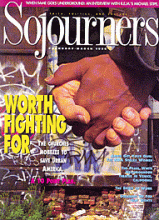"Community" is rapidly becoming the buzzword of the '90s. Yet while many people seek community, few seem to find it. Ironically, the more frequently the word is heard in the common parlance, real community becomes increasingly rare. It only adds to the confusion when national leaders toss about such expressions as "the business community," "the African-American community," even "the global community."
For Wendell Berry, none of these phrases makes any sense. As he explains in Sex, Economy, Freedom & Community, his newest book of essays, a community is defined by a shared connection to a specific, local place. This connection involves not only social ties but natural ones as well; a careless attitude toward our natural surroundings ultimately hurts the other human beings with whom we share them.
By and large, we have abandoned the work of nurturing our local communities for the quick, easy payoffs of "the global economy," and the results are plain to see. Without strong communities to serve as mediators - both between the individual and the larger society and between people and nature - violence and chaos reign in the social sphere just as poisoning and degradation do in the natural.
Even those well-intentioned people who advise us to "think globally, act locally" are part of the problem as Berry sees it. Global thinking has gotten us into this mess; only local thinking can get us out. Only when we keep the scale of our work small and our vision close to home can we be good neighbors and responsible stewards.
"Global thinking" is but one of the sacred cows that Berry knocks off its pedestal.
Read the Full Article
